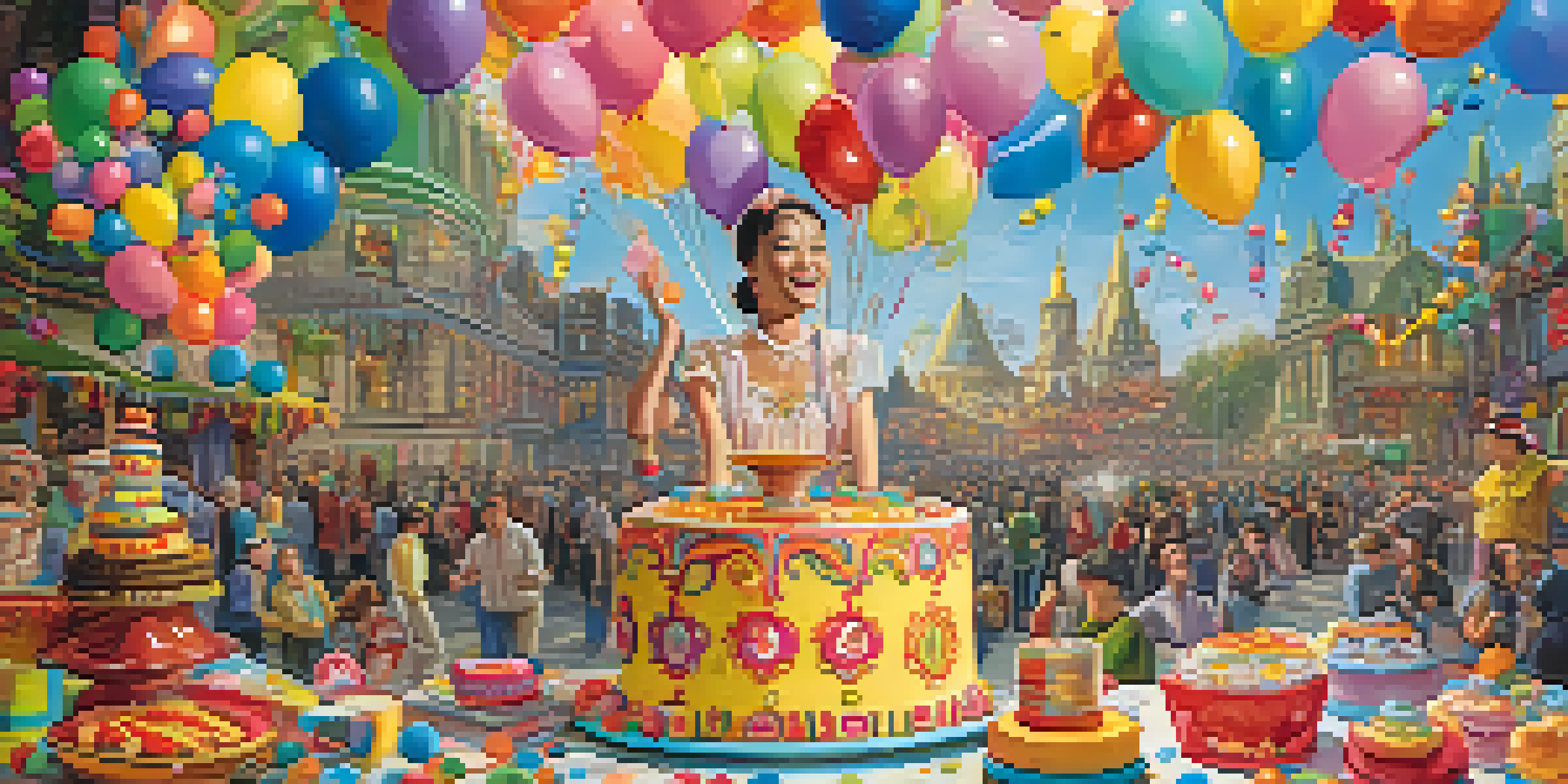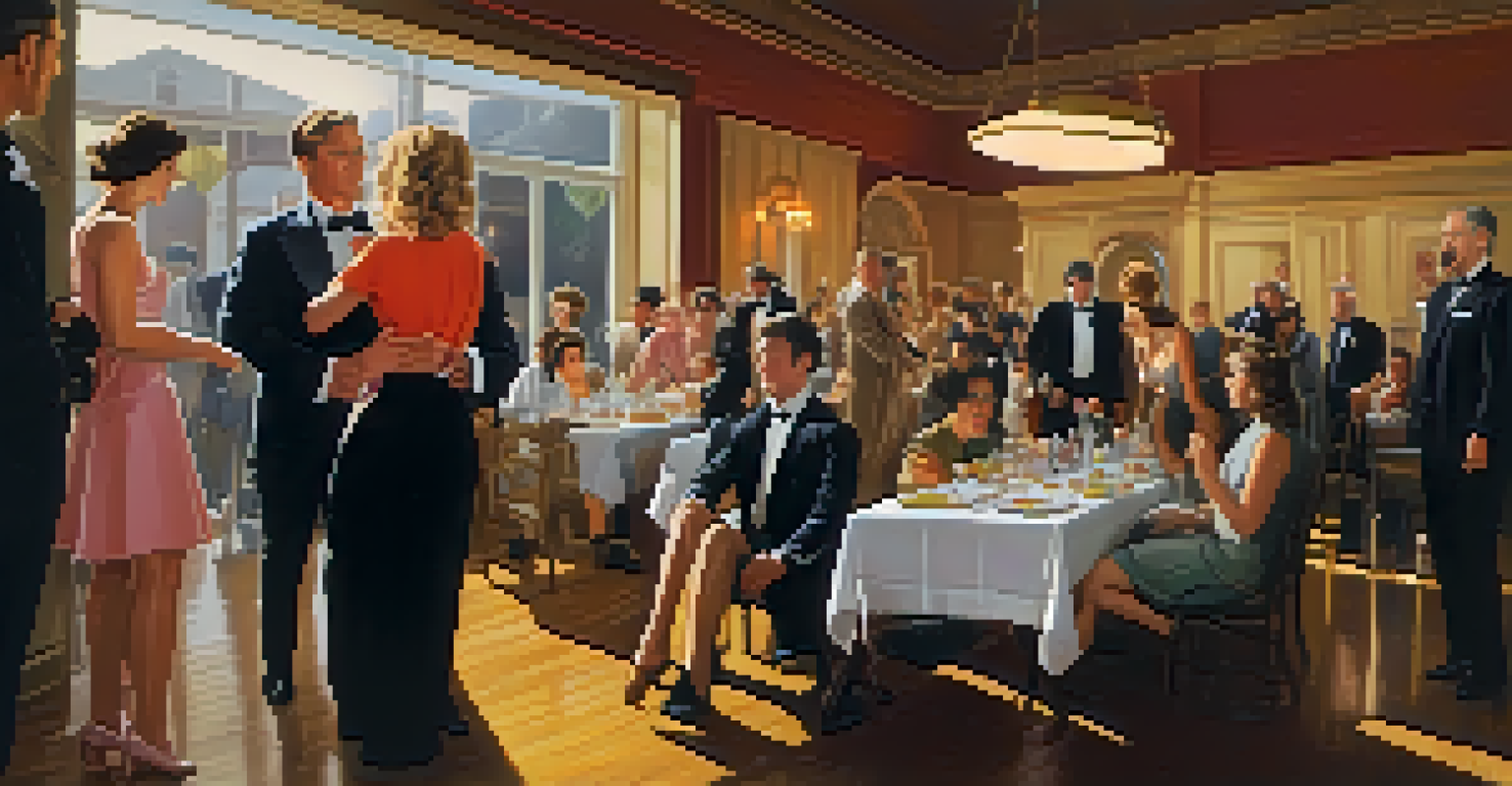The Role of Irony in Film Humor and Audience Connection

Understanding Irony: A Brief Overview
Irony is a literary device that conveys a meaning opposite to what is expected. In the context of film, it often serves to create humor, as audiences find delight in the twist of fate or unexpected outcomes. For instance, a character might prepare for a grand celebration only to inadvertently cause a disaster, which highlights the ironic gap between expectation and reality.
Irony is the gaiety of reflection and the joy of wisdom.
This element of surprise can elicit laughter, as viewers connect with the absurdity of the situation. Irony in film often involves three main types: verbal, situational, and dramatic, each bringing a unique flavor to the storytelling. By understanding these forms, we can appreciate how filmmakers craft moments that resonate with audiences on different levels.
Ultimately, irony allows for a richer narrative experience, inviting viewers to engage more deeply with the film. As we explore how irony manifests in various films, we'll see how it not only entertains but also connects audiences to the characters and themes.
Irony as a Catalyst for Humor in Film
Film humor often thrives on irony, where characters find themselves in laughably absurd circumstances. For example, in the classic film 'Airplane!', the use of situational irony amplifies the comedic effect as characters react to outrageous scenarios in a deadpan manner. This juxtaposition of serious reactions to ridiculous events creates a humorous disconnect that captivates audiences.

Moreover, comedic timing plays a crucial role in delivering ironic humor effectively. A well-placed punchline can turn a mundane interaction into a memorable moment, leaving the audience in stitches. The key is in the execution; when irony is timed just right, it becomes a powerful tool for eliciting laughter.
Irony Enhances Film Humor
Irony serves as a vital comedic device in films, creating unexpected twists that evoke laughter and deepen audience engagement.
As viewers, we often find ourselves in on the joke, which strengthens our connection to the film. This shared understanding fosters a sense of camaraderie among the audience, as we laugh together at the unexpected turns the plot takes.
The Connection Between Irony and Relatability
Irony resonates because it reflects the complexities of real life, where expectations frequently clash with reality. Characters in films often face ironic situations that mirror our own experiences, making them relatable. For instance, in 'The Office', characters frequently find themselves in hilariously ironic predicaments that echo the absurdity of everyday work life.
The greatest irony of life is that its very fragility gives it a sense of urgency and meaning.
This relatability enhances the emotional connection between the audience and the characters. When viewers see their own struggles and triumphs mirrored in ironic moments, it fosters empathy and a deeper investment in the story. We laugh not just because it's funny, but because we recognize the truth in the humor.
Furthermore, irony allows filmmakers to tackle serious subjects with a lighter touch. By presenting poignant themes through an ironic lens, films can engage audiences without overwhelming them, creating a balance that encourages both laughter and reflection.
Dramatic Irony: Building Tension and Humor
Dramatic irony occurs when the audience knows something that the characters do not, creating both tension and humor. This technique is particularly effective in comedies, as it allows viewers to anticipate the hilarity that will ensue when characters finally catch on. A classic example can be found in 'Romeo and Juliet', where the audience knows the tragic fate awaiting the lovers while they remain blissfully unaware.
In comedic films, this type of irony enriches the narrative by layering humor onto the unfolding drama. As viewers, we can't help but laugh at the characters' obliviousness, while also feeling a pang of empathy for their impending realizations. This duality keeps us engaged and invested in the outcome.
Relatability Through Irony
Irony reflects real-life complexities, making characters' ironic situations relatable and fostering emotional connections with the audience.
Ultimately, dramatic irony serves as a bridge between humor and emotional depth, allowing audiences to experience a range of feelings. By skillfully weaving these elements together, filmmakers create a more immersive and entertaining experience.
The Use of Verbal Irony in Character Interactions
Verbal irony, where a character says one thing but means another, is a staple of film humor. This form of irony often manifests in witty banter and sharp dialogue, adding layers of meaning to character interactions. For example, in 'Mean Girls', the character Regina George delivers several lines that are dripping with sarcasm, creating humor through her ironic remarks.
Such exchanges not only elicit laughs but also reveal character traits and dynamics. Verbal irony allows characters to express their frustrations or desires in a humorous way, making their interactions more engaging. Audiences are drawn to these moments, as they highlight the complexities of human communication.
Moreover, verbal irony can create memorable catchphrases that resonate with viewers long after the film ends. These iconic lines become part of popular culture, showcasing the lasting impact of irony in film humor.
Irony in Satire: A Tool for Social Commentary
Irony is a powerful tool in satire, allowing filmmakers to critique societal norms and behaviors with humor. Films like 'Dr. Strangelove' use irony to expose the absurdity of war and politics, making serious themes more digestible. By presenting these issues through an ironic lens, filmmakers provoke thought while entertaining audiences.
This blend of humor and critique invites viewers to reflect on the world around them. The use of irony in satire not only entertains but also encourages audiences to question societal values and behaviors. It transforms laughter into a catalyst for change, prompting discussions that extend beyond the screen.
Dramatic Irony Builds Tension
Dramatic irony engages viewers by allowing them to anticipate humor and drama, enriching the storytelling experience.
By engaging with these ironic narratives, viewers become more aware of the complexities of life and society. This connection fosters a deeper understanding of the themes at play, making the film experience both enjoyable and enlightening.
The Future of Irony in Film: Trends and Innovations
As film continues to evolve, so does the use of irony as a comedic device. With the rise of streaming platforms and diverse storytelling, filmmakers are experimenting with new ways to incorporate irony into their narratives. This innovation allows for fresh perspectives on humor, appealing to a broader audience.
One trend is the blending of genres, where irony is used to subvert traditional expectations. For instance, horror-comedies like 'What We Do in the Shadows' utilize irony to create humor within a typically serious genre. This crossover not only entertains but also showcases the versatility of irony in storytelling.

As audiences become more sophisticated in their understanding of humor, filmmakers will continue to adapt and innovate. The future of irony in film promises to be an exciting journey, filled with unexpected twists and laughter that keeps viewers coming back for more.